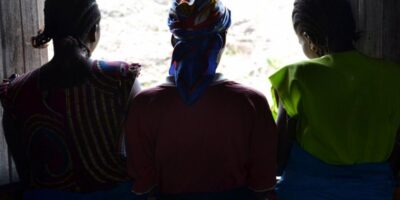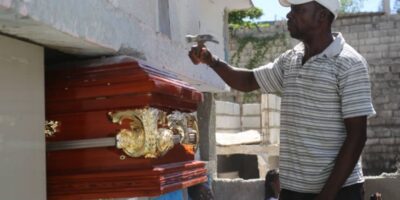The Grand Sud (Southern Region) is the favorite among these professionals who settle in the provinces in the face of the staggering rise of insecurity in the capital. As for the Grand Nord (Northern Region), cities such as Cap-Haitian and Saint-Marc are more and more coveted
It took Marc André nearly four years to build his house in Croix-des-Bouquets. At the time, this commune was known for its calm and attracted the attention of the middle class in search of land for real estate projects.
Six years later, in March 2022, this communications professional had to flee his residence because of the worrying deterioration of security in his neighborhood, triggered by clashes between the “Chen Mechan” and “400 Mawozo” gangs.
The rise of crime in Croix-des-Bouquets combined with acts of kidnapping and banditry in Port-au-Prince and its surroundings forced André to make a difficult decision: find refuge in one of the peaceful neighborhoods of Port-au-Prince or move to the provincial cities.
It took Marc André nearly four years to build his house in Croix-des-Bouquets.
“I had decided to settle permanently in the South Department in order to reduce stress related to insecurity,” said Marc André. The communications specialist was already working in the South for a non-governmental organization (NGO) and used to return to Croix-des-Bouquets every weekend to visit his family.
Like Marc André, many other professionals, young and old, have left the Port-au-Prince metropolitan area in recent years. This is due to the deterioration of the security climate.
Read also: Haitian immigrants to the U.S. face mental health issues
This migration is the result of the socio-political conditions of Port-au-Prince, considers sociologist Jean Robert Joseph. “Port-au-Prince no longer attracts people. People from other departments who were forced to come to the capital for study or employment reasons are returning to their hometowns to start a new life,” says the sociologist.
The city of Les Cayes, for example, is currently experiencing a huge demographic explosion. In addition to people returning home, those who used to go to Port-au-Prince have not been doing so for a few years, reports urban planner Michèle Oriol.
Like Marc André, many other professionals, young and old, have left the Port-au-Prince metropolitan area in recent years.
“Moreover, the universities in the city of Les Cayes are currently full because most young people from the southern region, such as those from the department of Grand-Anse and Nippes for example, settle in Les Cayes instead of migrating to Port-au-Prince”, she observes.
Historically, continues Oriol, « the Grand Sud, with the departments of the South, Grand’Anse, Nippes, and Sud’Est, is known for its massive migration to Port-au-Prince and surrounding areas. “The migration of the Northern Region is almost insignificant. The Northern Region tends to go to the Dominican Republic”, says the Executive Secretary of the Committee for Territorial Development (CIAT).
Read also: Renting a house in the Dominican Republic, a real challenge for Haitians
This demographic pressure towards certain provincial cities requires housing. As there is no urban plan to accommodate this new wave, houses are being built all over the city of Les Cayes for example, according to the observations of urban planner Michèle Oriol.
The Grand Sud […] is known for its massive migration to Port-au-Prince and surrounding areas.
“Stores and houses stand on the edge of the irrigation canals not far from Quatre Chemins, at the entrance to the city”, she said, emphasizing the vulnerability of Les Cayes in terms of flooding.
On his side, the sociologist Jean Robert Joseph believes that this unorganized urban explosion risks stifling some cities in the country. “The State should look into this phenomenon to create new clusters to avoid high levels of concentration in large cities akin to Port-au-Prince,” he said.
Internal migration is not new. Initially, some families moved to other parts of the country for love or for family. Natural hazards also force people to move within the country. After the earthquake of 2010, several families left Port-au-Prince to settle in other departments or in their department of origin.
Internal migration is not new.
But this new form of migration to provincial cities is linked to concerns about living away from the unprecedented wave of violence in the metropolitan area. “I was looking for peace of mind. In Port-au-Prince, tension is high, whereas life in Les Cayes is relatively calm,” said Ernst Charles, a veterinarian who works in the south.
Prior to 2019, Charles resided in Juvénat, a wealthy neighborhood near Port-au-Prince. He sometimes stayed in provincial cities to work on projects run by the NGO he worked for. But the sharp increase in insecurity under the late President Jovenel Moïse’s administration painted a bleak future in the eyes of the veterinarian.
“With the growing insecurity and the multiple cases of kidnapping that have been recorded, I submitted a request to my supervisors to be able to stay and work in the provinces”, says Charles who studied in Cuba and Chile. The professional’s request was granted and since then, he has settled in the city of Les Cayes with his wife and two children.
This migration is the result of the socio-political conditions of Port-au-Prince, considers sociologist Jean Robert Joseph.
For his part, economist Énomy Germain believes that there is a well-defined category of people who migrate to provincial cities. “It is not about middle-class people, but rather those who do not have an economic activity that allows them to develop a certain attachment to the metropolitan area. Many of them came from the provincial cities and they know that they could adapt to life in the countryside when they return”, he says.
For him, the case of professionals who ask their office to transfer them to provincial cities is rare.
The case of Claudette Jocelyn illustrates the economist’s point. The former merchant of woven ribbon from downtown Port-au-Prince had decided to return to live in St. Jean du Sud since the immeasurable control of the country’s largest informal market by armed men. The merchant is now hanging on to agriculture and her business to survive in her hometown.
The adaptation is sometimes difficult in the first stages of this new adventure.
However, she reports that she was living a peaceful life away from the threatening gunfire of the bandits at the Croix-des-Bossales market.
Inner peace is nevertheless not guaranteed despite the move to an area far from acts of banditry.
“Although I am at peace where I am now, I am always upset when I get a call from a loved one who resides in Port-au-Prince. At any time, you can receive news of a kidnapping or the murder of a loved one”, said Ernst Charles.
The other aspect of living outside of Port-au-Prince, according to economist Énomy Germain, is the cost of living. In general, prices tend to be higher in provincial cities. The adaptation is sometimes difficult in the first stages of this new adventure.
English translation by Didenique Jocelyn and Sarah Jean.
© Cover photo : DCStudio/Freepik







Comments